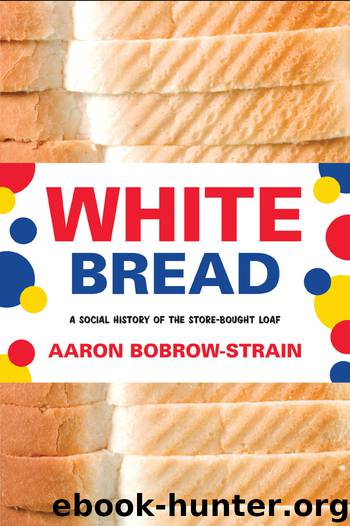White Bread by Aaron Bobrow-Strain

Author:Aaron Bobrow-Strain
Language: eng
Format: epub
ISBN: 9780807044681
Publisher: Beacon Press
AFTERMATHS OF ENRICHMENT
Synthetic enrichment transformed the way America thought about and ate bread. Thanks to the imperative of building a strong national defense, it did so in a way that was relatively egalitarian. National health was too important to be left to the whims and fashions of elite consumers, which seem to drive present-day food movements. And this raises interesting questions for us today. Thinking back on the wartime campaign for enrichment, I can’t help but wonder what level of urgency it would take to move present-day America toward a future where everyone, not just elite shoppers, had access to healthy, safe, environmentally and socially responsible food. Perhaps expanding national security to include food security is just what we need.
At the same time we should realize that during World War II, intense concern about nutrition and national defense pushed aside alternative ideas about improving America’s most important food, smoothing the way for the triumph of an expedient compromise dominated by mainstream nutrition scientists, industry voices, and government agencies. In the long run, by redeeming sliced white bread in the face of scientific criticism, the association of food and defense brought the country another step closer to the wholesale triumph of chemically infused, Styrofoam-textured white bread. Indeed, without the wartime campaign for enrichment and the government-backed dismissal of nonsynthetically enriched “health breads” that accompanied it, we might not have witnessed the postwar golden age of Wonder bread. Industrial bakers’ ability to associate their product with vigorous defense and spirited competition saved sliced white bread from declining consumption. Ultimately it helped lay a foundation for the postwar triumph of processed foods.
Today, local foodies, health food advocates, and anti-obesity crusaders might consider industrial white bread a national security threat, not an asset. But, in some important way, they owe their ability to speak easily about diet and defense to the training Americans received in the WWII-era campaign for synthetic bread enrichment. In this sense, they inherit a language with the power to galvanize rapid change, stir communities into action, and join disparate interests with a common purpose. But they should also know that urgency comes with a price. Even the most well-intentioned food activists might find that playing the national security card facilitates unfortunate coalitions and limits options where they had hoped to open new horizons.
Download
This site does not store any files on its server. We only index and link to content provided by other sites. Please contact the content providers to delete copyright contents if any and email us, we'll remove relevant links or contents immediately.
| Culinary Biographies | Essays |
| Food Industry | History |
| Reference |
A Court of Wings and Ruin by Sarah J. Maas(7847)
The Death of the Heart by Elizabeth Bowen(3622)
Better Homes and Gardens New Cookbook by Better Homes & Gardens(3595)
The Sprouting Book by Ann Wigmore(3592)
BraveTart by Stella Parks(3450)
Salt, Fat, Acid, Heat: Mastering the Elements of Good Cooking by Nosrat Samin(3147)
Sauces by James Peterson(3099)
Kitchen confidential by Anthony Bourdain(3090)
The Bread Bible by Rose Levy Beranbaum(3071)
Classic by Mary Berry(3014)
Solo Food by Janneke Vreugdenhil(2976)
Ottolenghi - The Cookbook by Yotam Ottolenghi(2946)
Martha Stewart's Baking Handbook by Martha Stewart(2860)
Day by Elie Wiesel(2783)
Betty Crocker's Good and Easy Cook Book by Betty Crocker(2724)
My Pantry by Alice Waters(2621)
The Plant Paradox by Dr. Steven R. Gundry M.D(2621)
The Kitchen Counter Cooking School by Kathleen Flinn(2520)
Hot Sauce Nation by Denver Nicks(2495)
